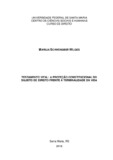| dc.contributor.advisor | Nascimento, Valéria Ribas do | |
| dc.creator | Wilges, Marilia Schwengber | |
| dc.date.accessioned | 2017-05-05T03:34:25Z | |
| dc.date.available | 2017-05-05T03:34:25Z | |
| dc.date.issued | 2016-12-16 | |
| dc.date.submitted | 2016 | |
| dc.identifier.uri | http://repositorio.ufsm.br/handle/1/2829 | |
| dc.description | Trabalho de conclusão de curso (graduação) - Universidade Federal de Santa Maria, Centro de Ciências Sociais e Humanas, Curso de Direito, RS, 2016. | por |
| dc.description.abstract | The living will, instrument of relatively recent approach in Brazil, brought up bioethical and legal discussions on the termination of life. With the advancement of the medical sciences, alienated from human responsibility, arises the discipline of bioethics, which, guided by principles, such as that of autonomy, was designed to regulate the medical conduct and the doctor-patient relationship. In the face of this new relationship paradigm, there are issues involved in the autonomy to die, such as euthanasia, dysthanasia, misthanasia and assisted suicide. The encounter between the dilemmas of medical-therapeutic limitation, informed consent, palliative care, orthothanasia and living will reflects the patient‟s self-determination power in life terminality in favor of dignity. The consecration of the dignity of the human person as the foundation of the Democratic State Law has taken placed from the post-war context, marked by the consolidation of human rights, the post-positivism crisis, and the development of neo-constitutionalism. The 1998‟s Federal Constitution, therefore, reflects the material supremacy of the rights and the opening of the constitutional text for principles of high axiological charge, so that constitutional hermeneutics is based mainly on the dignity of the human person, a principle related with that of private autonomy. In view of this context and the lack of relevant legislation, it is necessary to analyze the constitutional protection of individual rights against the life terminality, ascertaining, from a case study involving reports of terminal situations, the possibility of endorsing the right to a dignified death in the terminal situations in brazil‟s legal order. The present research was structured with the inductive, monographic, descriptive, comparative and bibliographic methods. | eng |
| dc.language | por | por |
| dc.publisher | Universidade Federal de Santa Maria | por |
| dc.rights | Acesso Aberto | por |
| dc.subject | Testamento vital | por |
| dc.subject | Bioética | por |
| dc.subject | Limitação médico-terapêutica | por |
| dc.subject | Dignidade da pessoa humana | por |
| dc.subject | Autonomia privada | por |
| dc.subject | Living will | eng |
| dc.subject | Bioethics | eng |
| dc.subject | Medical-therapeutic limitation | eng |
| dc.subject | Dignity of the human person | eng |
| dc.subject | Private autonomy | eng |
| dc.title | Testamento vital: a proteção constitucional do sujeito de direito frente à terminalidade da vida | por |
| dc.title.alternative | Living will: the constitutional protection of the individual rights in presense of life terminality | eng |
| dc.type | Trabalho de Conclusão de Curso de Graduação | por |
| dc.degree.local | Santa Maria, RS, Brasil | por |
| dc.degree.graduation | Curso de Direito | por |
| dc.description.resumo | O testamento vital, instrumento de abordagem relativamente recente no Brasil, traz à lume discussões bioéticas e jurídicas em torno da terminalidade da vida. Com o avanço das ciências médicas alienadas de responsabilidade humana, surge a disciplina Bioética, que, pautada em princípios como o da autonomia, destina-se a regular a conduta médica e a relação médico-paciente. Diante do novo paradigma dessa relação, surgem questões envoltas na autonomia de morrer, como eutanásia, distanásia, mistanásia e suicídio assistido. O encontro entre os dilemas da limitação médico-terapêutica, consentimento informado, cuidados paliativos, ortotanásia e testamento vital refletem o poder de autodeterminação do paciente na terminalidade da vida em prol da dignidade. A consagração da dignidade da pessoa humana como fundamento do Estado Democrático de Direito se deu a partir do contexto pósguerra, de consolidação dos direitos humanos, da crise do positivismo e do desenvolvimento do neoconstitucionalismo. A Constituição Federal de 1988 reflete a supremacia material dos direitos e abertura do seu texto a princípios de elevada carga axiológica, de forma que a hermenêutica constitucional se pauta sobretudo pela dignidade da pessoa humana, princípio este correlato ao da autonomia privada. Diante desse contexto e da inexistência de normativa pertinente, cumpre analisar a proteção constitucional do sujeito de direito frente à terminalidade da vida, averiguando, a partir de estudo de caso envolvendo relatos de situações terminais, a possibilidade de respaldo jurídico ao direito à morte digna nessas situações, a luz dos princípios da dignidade e autonomia. Estruturou-se a pesquisa com os métodos indutivo, monográfico, descritivo, comparado e bibliográfico. | por |
| dc.publisher.unidade | Centro de Ciências Sociais e Humanas | por |


